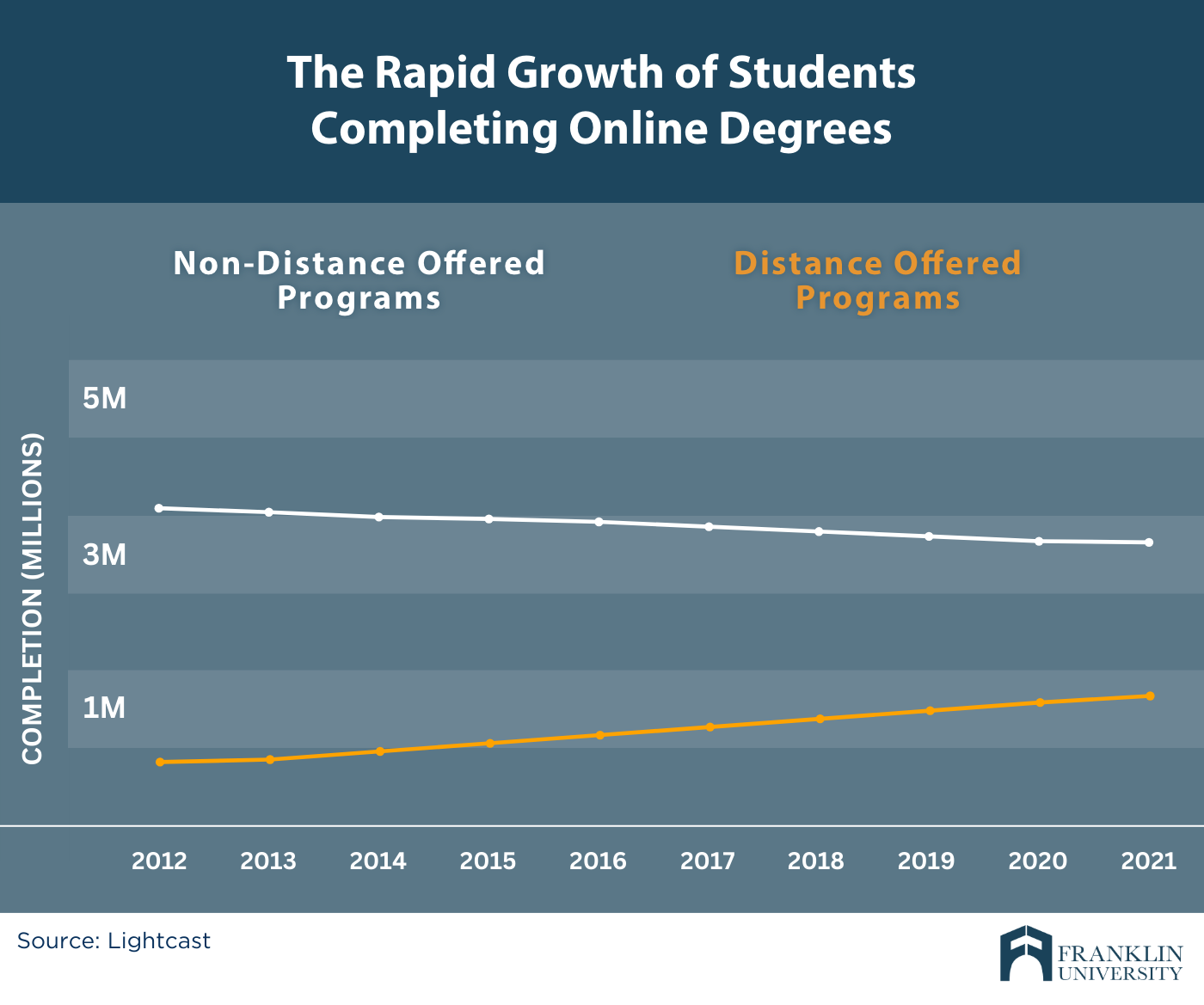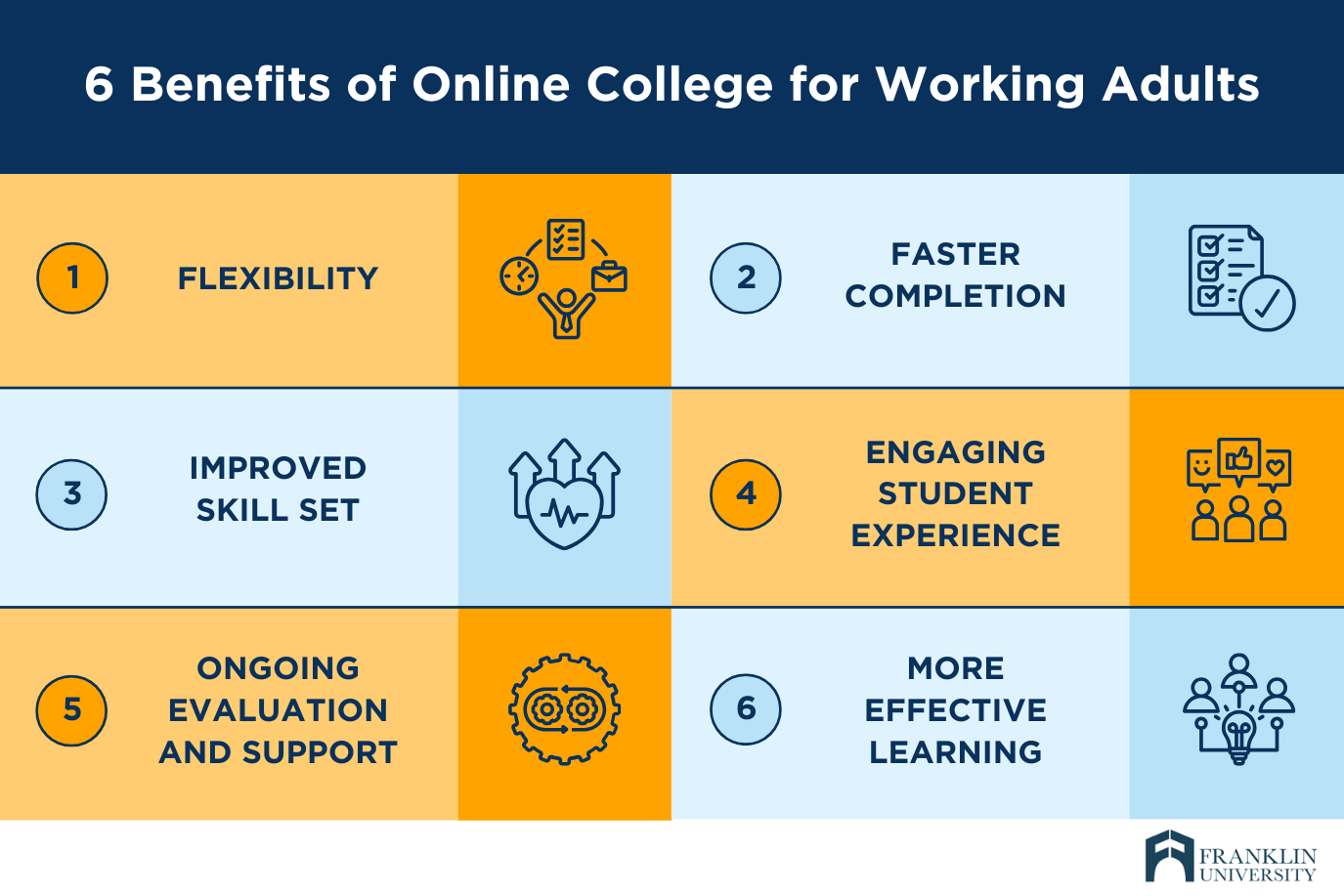Request Information
We're Sorry
There was an unexpected error with the form (your web browser was unable to retrieve some required data from our servers). This kind of error may occur if you have temporarily lost your internet connection. If you're able to verify that your internet connection is stable and the error persists, the Franklin University Help Desk is available to assist you at helpdesk@franklin.edu, 614.947.6682 (local), or 1.866.435.7006 (toll free).
Just a moment while we process your submission.

Are Online Degrees Worth It?
Online degree programs aren’t just popular—they’ve become the new normal within higher education. Which is why the demand for more accessible, flexible and affordable education has some colleges and universities transitioning from classroom learning to online learning.
And the proof that the shift from traditional to online education is real is found in degree completion rates like these from labor market analytics firm Lightcast.
According to Lightcast, from 2012 to 2021 degree completions for online programs increased by +93.4%. On the other hand, the number of degrees completed in non-distance offered programs decreased by -8.7%

So, as more and more institutions up their online degree program game, how will you know which online degree is best among all the rest?
Here’s a guide to help you determine if an online college and its degree programs are credible, not to mention a worthwhile investment of your time, energy and tuition budget.
Are Online Colleges Credible? Here’s How to Tell.
Choosing a reputable online college means finding a college or university that offers these three things: (1) high-quality degree programs, (2) dedicated student support services and (3) proven learning outcomes.
Here are four steps to help you evaluate the credibility of any online college:
Step 1: Check Accreditation
Make sure you know if the online college is accredited. But don’t stop there. Make sure you know what type of accreditation the college has earned. Remember, accreditation is the gold standard of quality in higher education.
If you’re looking for a program that passes the strictest quality standards, look for an institutionally accredited (formerly regionally accredited) online college. Also, check to see if your desired degree program is accredited, too. Some programs, like nursing and business, have specialized accrediting bodies.
Step 2: Evaluate Carefully
Be extra mindful when evaluating for-profit online colleges. Some for-profit institutions have a track record of producing inferior outcomes with their online degrees. Government regulation has helped rein in some of the worst offenders so while some for-profit institutions have turned a corner, others may still favor profit over student experience. If you’re considering a for-profit institution, do some in-depth research to make sure that the school has demonstrated student success.
When it comes to paying for school, grants are among your best options. But do you know how to find them? Remove the guesswork by downloading this free guide
Step 3: Examine Completion Rates
If you’re seriously considering enrolling in an online degree program, be sure to look at completion percentages. These percentages show how many students actually finish their degrees and are a pretty good indicator of program quality and student support services. These percentages are also a sign that students deem their education worth it.
Step 4: Ask Questions
There’s only so much information you can acquire through online research, so talk to people with first-hand experience at the college or university of your choice. Reach out to the institution and ask to speak with admissions staff and faculty members. You can also ask to speak with a current student or graduate. These conversations can give you deeper insight and create a more complete picture of your potential student experience.
Are Online Degrees Respected by Employers?
This is a common question among online learners. Unfortunately, it’s a misleading question. The fact is, the credentials for an online degree are the same as an in-person degree: associate, bachelor’s, master’s and doctorate. The difference is in the way you take classes, which is why the better question is: Will this particular online university and its degree program have the respect of a future employer?
You’ll want to make sure that you enroll in an accredited school with a professionally developed curriculum tied to learning outcomes.
Remember, when a potential employer looks at your resume, they have no way of knowing whether you got your degree online unless you tell them. Even if they do know that you earned your degree online, there’s nothing for you to do or explain.
“There may have been a stigma around online colleges in the past,” says Dr. Joel Gardner, assistant dean of Instructional Design at Franklin University, “but the quality of online instruction has come so far. Today’s online programs are not only on-par with in-person education, some studies say they surpass the effectiveness of face-to-face instruction.”
Your employer doesn’t care how you earned your degree. They just want to know if you earned it from a reputable school, what type of degree you earned and whether you have the skills and professional integrity to do the job.
What to Look for In an Online College
If these are the criteria employers care most about, how can you make sure your online college prepares you for success?
Here’s a checklist of things to help your post-graduation resume stand out:
- An institutionally accredited institution: Bonus points for institutions with program-specific accreditation for selected programs.
- Best practice programs and curriculum: New programs in specialized areas and regularly updated curriculum are signs of innovative online colleges.
- Professional application: Indicators include hands-on simulations, collaborative projects, and the use of industry-standard tools.
- Professional networking: Look for industry partnerships, relationships with professional societies, mentorship opportunities, and faculty who are industry practitioners.
6 Advantages of Online Degrees for Working Adults
Earning a degree as a working adult is very different from earning one as a traditional undergraduate student. As a working professional, you’re already balancing career, personal and community responsibilities. So even though finishing your degree is a high priority, you’ll want a program that caters to your unique needs.

Here are six benefits of online colleges for working adults who want to advance their careers:
- Offers more flexibility: This includes when you take classes to when you complete assignments. A lack of scheduling conflicts can also positively impact retention rates.
- Enables faster completion: You can often earn your degree faster online than with a traditional program. On the other hand, if you have a busy schedule with many personal and professional commitments, you can also take one course at a time. Ultimately, the pace at which you complete your degree is up to you.
- Emphasizes skill-building over theoretical-only comprehension: The right program will teach you skills you can use on the job in your current role while also preparing you for future advancement.
- Leverages advanced technology: This type of program allows you to easily collaborate with classmates and connect with instructors, so you enjoy a more engaging student experience without missing out on the interactive aspect inherent with traditional, in-person classes.
- Includes frequent check-ins and evaluations: This means you’ll have the focus and support of faculty to help if you start to fall behind.
- Builds in student participation: You can’t hide at the back of a lecture hall in an online class. You will be required to actively participate–and that can help you learn and apply what you learn more effectively.
An Online Degree Is Worth It … for the Right Type of Student
Now that you understand the benefits of an online degree, it’s up to you to determine if the advantages resonate with you.
If the answer is “yes,” congratulations! You’re ready to find an online college that aligns with your unique needs and professional goals.
Here’s a short list of things to look for when evaluating online degree programs designed for working adults:
- Maximum transfer credit
- Flexible scheduling and accelerated degree programs
- Real-world perspectives from experienced faculty and industry-relevant curriculum
- Engaging courses that leverage collaborative, cutting-edge technologies
Bonus tip: Start your exploration for the right online degree here.





